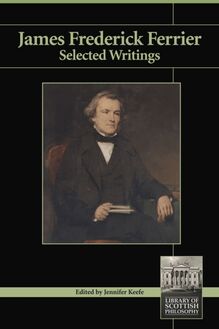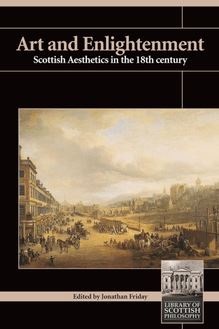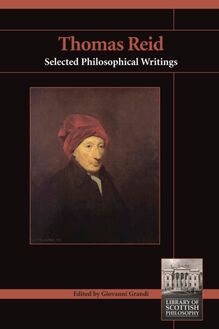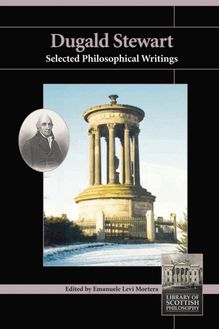Adam Smith , livre ebook
173
pages
English
Ebooks
2012
Vous pourrez modifier la taille du texte de cet ouvrage
Obtenez un accès à la bibliothèque pour le consulter en ligne En savoir plus
Découvre YouScribe en t'inscrivant gratuitement
Découvre YouScribe en t'inscrivant gratuitement
173
pages
English
Ebooks
2012
Vous pourrez modifier la taille du texte de cet ouvrage
Obtenez un accès à la bibliothèque pour le consulter en ligne En savoir plus
Publié par
Date de parution
02 octobre 2012
Nombre de lectures
7
EAN13
9781845404284
Langue
English
Publié par
Date de parution
02 octobre 2012
Nombre de lectures
7
EAN13
9781845404284
Langue
English
Title page
Adam Smith
Selected Philosophical Writings
Edited and Introduced
by James R. Otteson
Copyright page
Copyright © James R. Otteson, 2004
The moral rights of the author have been asserted.
No part of any contribution may be reproduced in any form without permission, except for the quotation of brief passages in criticism and discussion.
Originally published in the UK by Imprint Academic
PO Box 200, Exeter EX5 5YX, UK
Originally published in the USA by Imprint Academic
Philosophy Documentation Center
PO Box 7147, Charlottesville, VA 22906-7147, USA
2012 digital version by Andrews UK Limited
www.andrewsuk.com
Series Editor’s Note
The principal purpose of volumes in this series is not to provide scholars with accurate editions, but to make the writings of Scottish philosophers accessible to a new generation of modern readers. In accordance with this purpose, certain changes have been made to the original texts: Spelling and punctuation have been modernized. In some cases, the selected passages have been given new titles. Some original footnotes and references have not been included. Some extracts have been shortened from their original length. Quotations from Greek have been transliterated, and passages in foreign languages translated, or omitted altogether.
Care has been taken to ensure that in no instance do these amendments truncate the argument or alter the meaning intended by the original author. For readers who want to consult the original texts, bibliographical details are provided for each extract.
The Library of Scottish Philosophy was launched at the Third International Reid Symposium on Scottish Philosophy in July 2004 with an initial six volumes. Attractively produced and competitively priced, these appeared just fifteen months after the original suggestion of such a series. This remarkable achievement owes a great deal to the work and commitment of the editors of the individual volumes, but it was only possible because of the energy and enthusiasm of the publisher, Keith Sutherland, and the outstanding work of Jon Cameron, Editorial and Administrative Assistant to the Centre for the Study of Scottish Philosophy.
Acknowledgements
Grateful acknowledgement is made to the Carnegie Trust for the Universities of Scotland for generous financial support for the Library of Scottish Philosophy in general, and to George Stevenson for a subvention for this volume in particular. Acknowledgement is also made to the University of Aberdeen Special Libraries and Collections for the engravings for the cover of this volume of the Edinburgh Faculty of Advocates and of Leith Harbour from Modern Athens (1829).
Gordon Graham,
Aberdeen, July 2004
Introduction
Adam Smith was born in 1723 in Kirkcaldy, Scotland, and died in Edinburgh in 1790. Along with figures like his teacher Francis Hutcheson (1694–1746) and his friend David Hume (1711–76), Smith was one of the principals of a period of astonishing learning that has become known as the Scottish Enlightenment. He is the author of two books: the 1759 Theory of Moral Sentiments ( TMS ) and the 1776 Inquiry into the Nature and Causes of the Wealth of Nations ( WN ). His first book brought him considerable acclaim during his lifetime and was quickly considered one of the great works of moral theory—impressing, for example, such people as Immanuel Kant (1724–1804), who called Smith his ‘ Liebling ’ or ‘favourite’, and Charles Darwin (1809–82), who in his 1871 Descent of Man endorsed and accepted several of Smith’s ‘striking’ conclusions. TMS went through fully six revised editions during Smith’s lifetime. Since the nineteenth century, however, Smith’s fame has largely rested on his second book, which, whether judged by its influence or its greatness, must be considered one of the most important works of the millennium.
Smith matriculated at the University of Glasgow at the age of fourteen in 1737. He considered his instruction at Glasgow, which was heavy in the classics, quite good; the influence of Hutcheson, to whom Smith later referred to as ‘the never to be forgotten Dr Hutcheson’, was pronounced. After Glasgow, Smith was a Snell exhibitioner at Balliol College, Oxford, with whose level of instruction Smith was, however, not so impressed: ‘In the University of Oxford, the greater part of the public professors have, for these many years, given up altogether even the pretence of teaching.’ Smith made good use of the libraries at Oxford, however, studying widely in English, French, Greek and Latin literature. He left Oxford and returned to Kirkcaldy in 1746.
In 1748 Smith began giving in Edinburgh ‘Lectures on Rhetoric and the Belles Lettres’, as Kames’s biographer Alexander Tytler reports, focusing on literary criticism and the arts of speaking and writing well. It was during this time that Smith met and befriended Hume, who was to become Smith’s closest confidant and greatest philosophical influence. Smith left Edinburgh to become Professor of Logic at the University of Glasgow in 1751 and then Professor of Moral Philosophy in 1752. The lectures he gave there eventually crystallized into The Theory of Moral Sentiments.
In TMS, Smith argues that human beings naturally desire a ‘mutual sympathy of sentiments’ with their fellows, which means that they long to see their own judgments and sentiments echoed in others. Because we all seek out this ‘sympathy’—or ‘harmony’ or ‘concord’ of sentiments—much of social life is a give-and-take whereby people alternately try to moderate their own sentiments so that others can ‘enter into them’ and try to arouse others’ sentiments so that they match their own. This market-like negotiation results in the gradual development of shared habits, and then rules, of judgment about moral matters ranging from etiquette to moral duty. This process also gives rise, Smith argues, to an ultimate standard of moral judgment, the ‘impartial spectator’, whose perspective we routinely seek out in judging both our own and others’ conduct. When we use it to judge our own, it is what constitutes our conscience. We consult the impartial spectator simply by asking ourselves what a fully-informed but disinterested person would think about our conduct. If such a person would approve, then we may proceed; if he would disapprove, then we should desist.
Morality on Smith’s account is thus an earthly, grounded affair. Although he makes frequent reference to God and the ‘Author of Nature’, scholars disagree over to what extent such references do any real work in his theory—and thus to what extent Smith’s theory of moral sentiments is a relativistic account, eschewing reliance on transcendent, objective rules of morality. One way to understand Smith’s account, and to my mind the most promising, is as subscribing to a ‘middle-way’ objectivity. A community’s moral standards are not, so far as we know, eternally commanded by a transcendent being or order, yet neither are they perfectly arbitrary or subject to individual subjective whims. They arise as a consequence of at least two relatively fixed, and certainly objective features of the world: human nature and the physical environment in which human beings find themselves and develop communities. On Smith’s account, a community’s long-standing moral rules will have stood the test of time only if they turned out in fact to be conducive to the welfare of the members of the community given their actual natures and circumstances. That gives any new member of the community in question considerable reason to follow these rules, even if their origins or their actual connection to welfare remain obscure to him.
Smith’s substantive moral picture is heavily influenced by several ancient accounts. There is, for example, a strong strand of Stoicism—as evidenced immediately by the fact that Smith claims that self-command is the virtue that gives all the other virtues ‘their principal lustre.’ And Smith’s conception of the impartial spectator as the ultimate arbiter of propriety and merit bears an intriguing resemblance to Aristotle’s phronemos, or virtuous man. It may be that for Smith the impartial spectator determines propriety and merit, rather than discovering or reflecting them, just as it may be the actions of the virtuous man that for Aristotle are the true standard of virtue. Whether the impartial spectator creates or merely recognizes moral conduct will in the end depend in large part on where this standard comes from, that is, how it originates. Aristotle does not give a genetic account of his virtuous man, however, which leaves the question open for him; perhaps Smith’s historical genealogy of the impartial spectator can be seen as attempting to fill this lacuna in the theory.
A final issue of concern surrounding Smith’s moral theory, which I cannot hope to resolve here, is the extent to which Smith is in TMS merely describing the phenomenon of human morality, as a natural scientist or anthropologist might, or whether he is also making moral endorsements, as a person concerned to help people lead good or righteous lives might. Smith is clearly doing at least the former: one of his central goals is to describe the origins, maintenance and development of the human social institution of commonly shared morality. But is he also making or recommending moral judgments? Students of TMS disagree about this. My view is that Smith is offering a hypothetical imperative: given your nature and given the nature of human social institutions—which Smith has described in detail in TMS— then your best chance of being happy is to follow, at least for the most part, your community’s moral traditions. This interpretation would capture what I described above as Smith’s ‘middle-way’ objectivity, a














